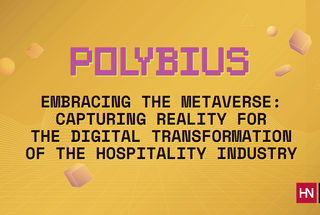Reality capture changes everything
Reality Capture in the Hospitality Industry. What you need to know?
Metaverse and Web3 in Hospitality — Viewpoint by Simone Puorto
Reality capture plays a crucial role in creating realistic and immersive digital representations of physical spaces within the metaverse. By scanning and capturing real-world environments, such as hotel rooms, event spaces, and other hospitality facilities, reality capture enables the seamless integration of physical spaces into the virtual reality.
In the hospitality industry, there are several effective applications of reality capture data that can have a transformative impact.
Some of the key areas where reality capture can be highly beneficial include:
- Virtual Tours and Marketing: enables the creation of immersive virtual tours that provide potential guests with a realistic and engaging experience. This allows them to explore hotel rooms, event spaces, restaurants, and other facilities virtually, helping them make informed booking decisions. Virtual tours can also be used in marketing materials to attract and entice customers, giving them a glimpse of the unique features and atmosphere of the property.
- Design and Renovation: Reality capture data is invaluable during the design and renovation phases of a hospitality property. By creating accurate 3D models of existing spaces, architects, designers, and project managers can visualize proposed changes and renovations more effectively. This helps in better planning, identifying potential challenges, and minimizing costly errors. It also enables stakeholders to collaborate more efficiently, streamlining the overall design and renovation process.
- Facility Management and Maintenance: Reality capture data can assist in facility management by providing accurate and up-to-date information about a property's physical infrastructure. This includes detailed 3D models of rooms, common areas, and facilities, which can be used for space planning, maintenance scheduling, and identifying areas that require attention. It streamlines maintenance processes, reduces downtime, and ensures a better overall guest experience.
- Event Planning and Layout Optimization: For hotels and venues hosting events, reality capture data can be instrumental in optimizing event layouts and configurations. Planners can virtually explore different setups, seating arrangements, and staging options, allowing for better space utilization and guest flow. This helps in creating more immersive and enjoyable experiences for event attendees.
- Training and Safety Protocols: Reality capture data can be used to create realistic training simulations for staff in the hospitality industry. Employees can virtually practice tasks, familiarize themselves with the layout of the property, and follow safety protocols in a risk-free environment. This improves training effectiveness, enhances safety practices, and ensures consistent service quality.
It's worth noting that the effective applications of reality capture data may vary depending on the specific needs and goals of each hospitality business. By assessing the unique requirements of your property, you can identify the areas where reality capture can deliver the most value and tailor its implementation accordingly.
Moreover, as the metaverse evolves, reality capture can be further utilized to create more advanced and interactive experiences. For instance, combining reality capture with technologies like haptic feedback and spatial audio can provide users with a more immersive and sensory-rich experience within the virtual representation of a hospitality space.
Overall, reality capture in the hospitality industry contributes to the development and expansion of the metaverse. It enables the seamless integration of physical spaces into the virtual realm, enhancing user experiences, facilitating informed decision-making, and ultimately shaping the future of how people interact with and experience hospitality services in a digitally connected world.

 by
by 

